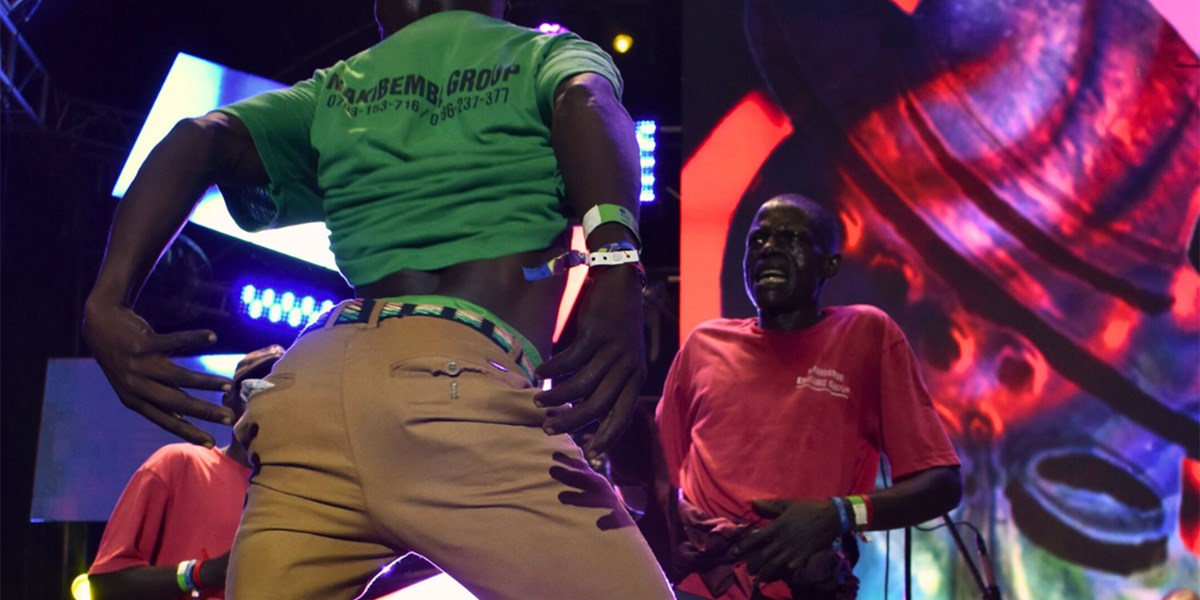Wednesday, February 12, 2025
Welcome to Africa’s largest music festival – Nyege Nyege
By Erin Cobby
At the heart of Uganda’s vibrant, innovative and optimistic music scene, ‘Africa’s largest music festival’ Nyege Nyege continues to surprise and delight

Nakibembe Xylophone Troupe
It’s been six years since I last attended the wholly unique Nyege Nyege Festival, and while the surroundings may have changed, the self-proclaimed ‘Afro Galactic Carnival’ on the Nile River – taking place November 14–17, 2024 – retains a near-frenzied spirit of creativity that pushes it into the radical.
Now ‘Africa’s largest music festival’, with over 300 artists from East Africa and beyond, the ethos and vibe of Nyege Nyege is one of cross-cultural collaboration and celebration. This is evidenced by the multiple stages, of which there are seven, loosely grouped around a golf course in Jinja, which has been transformed, largely by reclaimed materials, into a gigantic playground, equipped with a Ferris wheel which looks, and feels, like it was made out of old school chairs welded together.
The Spirit of Uganda stage highlights the country’s rich cultural diversity with performances from Teso local Patrick Atude and multiple regional dance troupes. This home-grown talent is shored up by two playful performances from Ugandan ensemble Arsenal Mikebe, who delight crowds with their mixing of electronic music and percussive polyrhythms and the ever-impressive mastery of the embaire by the Nakibembe Xylophone Troupe. The Dark Stage, however, shows how much Nyege Nyege pushes genre boundaries when it hosts an experimental and exorcist-like performance from Asian-American outfit Fitness.
It’s this intense range which impresses Jako Maron, an artist who is performing and experiments with the maloya music genre from La Réunion. “It’s not boring avant-garde music”, he offers, “it’s always intensely good, and in the context of being an African festival, this also helps it avoid the exoticism cliché.”
This platforming also lends itself to creating further connections, with Maron explaining that he will stay at the Nyege Nyege villa in Kampala after the festival to collaborate with some of the festival’s artists, including Chrisman from the DRC and Titi Bakorta, who currently resides in Paris. Collaboration isn’t limited to artists, however, as Moroccan DJ Cheb points out. Cheb, who performs technological interpretations of Morocco’s Gnawa and chaabi music, is impressed with the spontaneous musical experiences. “I think the energy shared by the artists and this crowd turns into liquid and goes in all directions”, he says, exploring one of my favourite things about Nyege, which is that through intimate performances and the community atmosphere, the line between performer and punter is often non-existent.
There is one thing different about this latest iteration, however. For the first time, Nyege closes the site during the day and instead organises events, including boat parties, bird-watching expeditions and fine-dining experiences with Africa’s top chefs around the town of Jinja. The highlight of these is the Sudanese Pavilion, a joyful, multisensory exploration which showcases the music, food, art and wares of the Sudanese refugees currently living in Uganda.
I ask Alaa Dishouni, a Sudanese singer who performed at the Pavilion, for her reflections. “The Pavilion brought music from all over Sudan and gathered it together. We were even composing at one point”, she explains. “We had a chance just to dance and play together; it was a very healing experience.” These connections have also continued to flourish beyond the confines of the festival. One Nyege Nyege organiser has started to organise rehearsals with many of the Sudanese musicians in East Africa with the aim of creating musical messages of peace to send to those still back home.
In 2025, Nyege Nyege will mark its 10th anniversary. If what I witnessed at the 2024 iteration is anything to go by, despite its growing fame, the festival will continue to excel. And this is because of the unique role it plays, as a space for artists and attendees alike to create, to collaborate and, increasingly, to mend.

